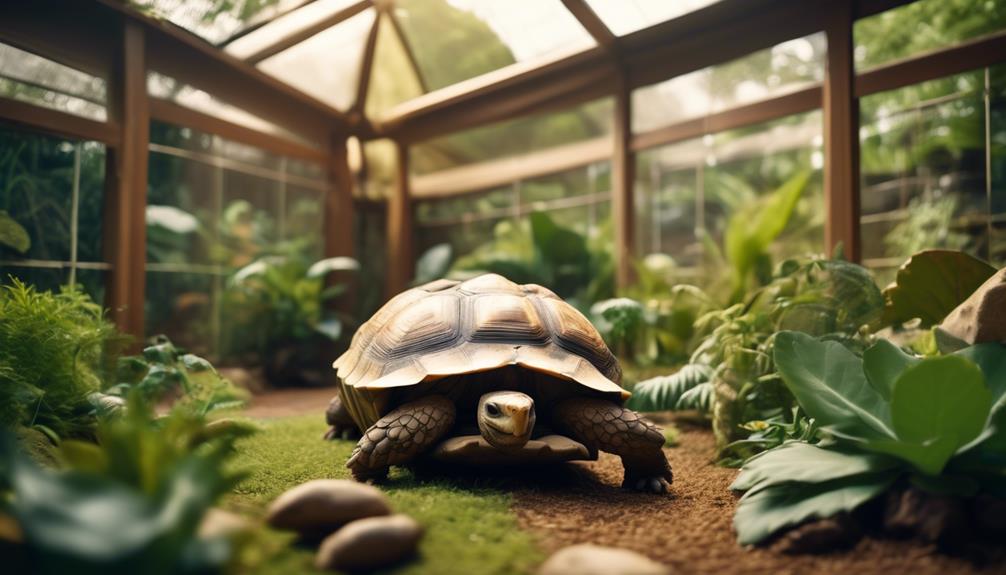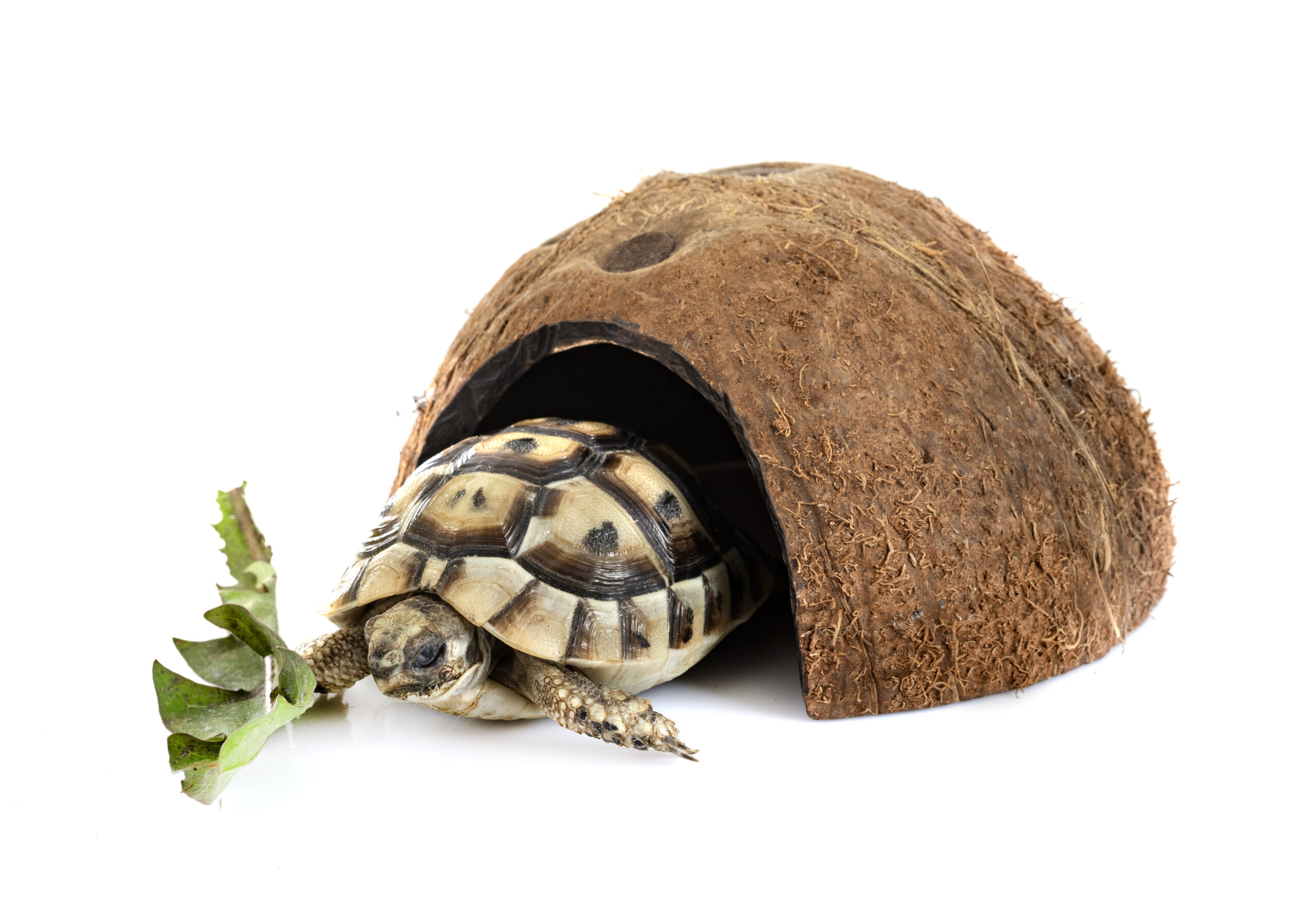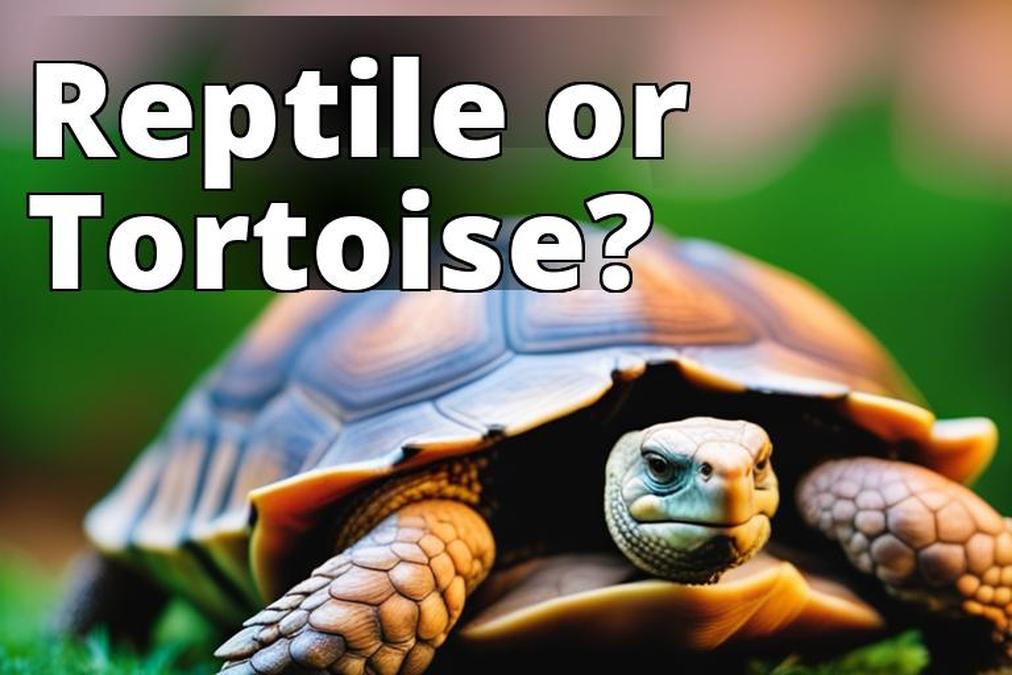Are you ready to revolutionize your pet turtle’s diet with a tropical twist? Brace yourself, because we’re about to uncover the truth about pineapple and its compatibility with tortoise and turtle nutrition.
You might be surprised to learn that this juicy fruit could be an excellent addition to their meals, packed with vital nutrients that can support their overall health. But before you rush to the nearest grocery store, there are a few important factors to consider.
Stick around to discover the dos and don’ts of feeding pineapple to your shelled friend, and unlock the secrets to providing a well-balanced and delicious diet that will keep them happy and healthy.
Key Takeaways
- Pineapple should be fed sparingly to turtles due to its high sugar content.
- Excessive consumption of pineapple can lead to digestive issues and liver abscesses in turtles.
- Pineapple can be included in a turtle’s diet, but it should be done in moderation and as an occasional treat.
- It is important to consult with a veterinarian to ensure a healthy and balanced diet for turtles, taking into consideration the potential digestive issues and nutritional imbalances that can arise from feeding pineapple.
What is the impact of feeding pineapple to turtles?
Wondering about the impact of feeding pineapple to your turtle? Is it safe for them to eat? How much pineapple is suitable for their diet? Are there any benefits to including pineapple in their meals?
Can box turtles eat pineapple as part of their diet? And what potential digestive issues should you be aware of when feeding them pineapple?
These are all important questions to consider when deciding whether to introduce pineapple into your turtle’s diet.
Is pineapple safe for turtles to eat?
Feeding pineapple to turtles should be done sparingly due to its high sugar content, as excessive consumption can lead to digestive issues and liver abscesses. While pineapples can be a part of a turtle’s diet, it’s important to remember that they should be fed in moderation.
Turtles have a natural diet that consists of various fruits and vegetables, and pineapple should only be given as an occasional treat. Pineapple is an acidic fruit that contains vitamins and minerals that can help improve digestion and fight off infections. However, feeding too much pineapple can upset a turtle’s stomach and cause nutritional imbalances.
It’s crucial to consult with a vet to ensure a healthy and balanced diet for your turtle, considering the impact of feeding pineapple.
How much pineapple is suitable for turtles?
If you’re considering adding pineapple to your turtle’s diet, it’s important to understand how much is suitable and the impact it can have on their health.
While turtles can eat pineapple, it should only be given on rare occasions and in small portions. Pineapple contains high levels of sugar, which can lead to digestive issues and liver abscesses if consumed in higher levels.
However, when fed in moderation, pineapple can help keep your turtle’s diet varied and provide them with important vitamins and minerals. It’s important to remember that pineapple shouldn’t be the main food for your turtle and should be supplemented with other fruits and vegetables.
Consulting with a vet will ensure you’re providing the right amount of pineapple for your turtle’s diet.
Are there any benefits of pineapple for turtles’ diet?
Turtles can benefit from the inclusion of pineapple in their diet due to its rich vitamin and nutrient content. Feeding pineapple to your turtle can be a rare treat that provides several advantages for their overall health. Here are some benefits of incorporating pineapple into your turtle’s diet:
- Pineapple is a great source of vitamin C, which helps boost the turtle’s immune system and aids in infection resistance.
- The calcium in pineapple contributes to strong bones, promoting the turtle’s overall bone health.
- Pineapple leaves contain fiber, which can aid in digestion and prevent constipation.
When feeding pineapple to your turtle, it’s important to remember that moderation is key. Too much pineapple can disrupt their natural diet and lead to nutritional imbalances. Additionally, avoid feeding canned pineapple, as it may contain added sugars or preservatives.
Can box turtles eat pineapple as part of their diet?
Incorporating pineapple into a box turtle’s diet should be done with caution due to its high sugar content. While pineapple can be a safe treat for turtles, it should be fed rarely to avoid health problems. The impact of feeding pineapple to box turtles is dependent on their species and natural diet. It is important to note that excessive consumption of pineapple can lead to digestive issues and nutritional imbalances. Feeding pineapple once a month or every few months is advised to prevent these problems. Additionally, pineapple contains bromelain, a powerful enzyme that may aid in digestion. However, it’s best to consult with a vet to ensure the appropriate dietary needs of your pet turtle are met.
| Keywords: | bearded dragons | added preservatives | pineapple as a rare | infections and illnesses | bromelain | foot tortoise | phosphorus ratio | cause serious | powerful enzyme | pet turtles |
|---|---|---|---|---|---|---|---|---|---|---|
| – | – | – | – | – | – | – | – | – | – | |
| Impact on box turtles | Not applicable | Not applicable | High sugar content should be fed rarely | Excessive consumption can lead to digestive issues and nutritional imbalances | Pineapple contains bromelain, a powerful enzyme that may aid in digestion | Not applicable | Not applicable | Not applicable | Consult with a vet to ensure appropriate dietary needs are met |
What are the potential digestive issues in turtles when feeding pineapple?
Feeding pineapple to turtles can lead to potential digestive issues and liver abscesses due to its high sugar content. While pineapple can offer some benefits to turtle nutrition, it’s important to be cautious about its consumption. Here are some potential digestive issues that turtles may experience when feeding pineapple:
- Imbalance in their natural diet: Pineapple, if fed too often, can disrupt a turtle’s balanced diet and cause nutritional imbalances.
- Health problems: Excessive consumption of pineapple can lead to health problems such as diabetes and obesity in turtles.
- Upset stomach and diarrhea: The acidic content in pineapples can cause an upset stomach and diarrhea in turtles.
To prevent these digestive issues, it’s recommended to feed pineapple in moderation and as a rare treat, supplementing it with other fruits and vegetables to ensure a well-rounded diet for your turtle.
What should be included in a turtle’s diet?
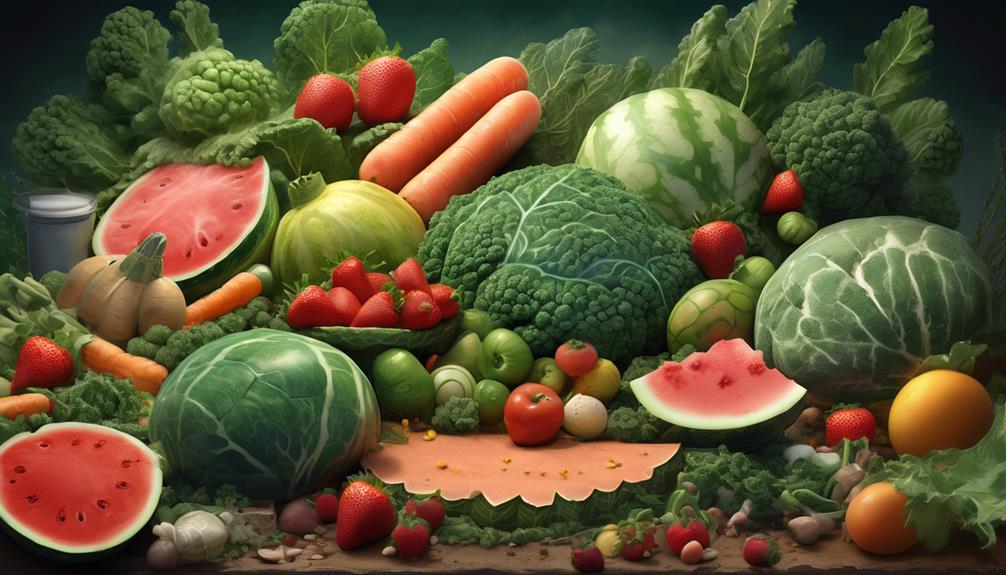
Are pineapple and other fruits and vegetables suitable for your turtle’s diet?
What food groups should you include in your pet turtle’s meals?
How can you ensure a balanced and healthy diet for your box turtle or tortoise?
Should you offer pineapple to baby turtles, and what are the risk factors associated with feeding them this fruit?
These are important questions to consider when determining the best diet for your turtle.
Are pineapples and other fruits and vegetables suitable for the turtle’s diet?
Turtles require a varied and balanced diet that includes a range of fruits and vegetables. Including pineapples in a turtle’s diet can be beneficial, but it should be fed in moderation as a treat.
Other fruits and vegetables that are suitable for turtles include leafy greens like kale and collard greens, as well as fruits like strawberries and bananas. These provide essential nutrients and vitamins that contribute to a healthy diet.
However, it’s important to remember that different turtle species have different dietary requirements, so consulting a veterinarian is recommended to ensure a well-rounded and species-specific diet for your turtle.
What food groups should be a part of a pet turtle’s diet?
What are the essential food groups that should be included in a pet turtle’s diet?
Turtles have varied diets based on their species, with some being omnivorous, others herbivorous, and some carnivorous. To ensure a well-rounded diet, it’s important to provide a mix of nutrients from different food groups.
For herbivorous turtles like box turtles and tortoises, plant matter should make up a large part of their diet. This includes leafy greens, vegetables like carrots and squash, and fruits like berries and melons.
For omnivorous turtles, a combination of plant matter and animal proteins is necessary. This can include worms, insects, small fish, and even cooked lean meats.
Additionally, essential vitamins and minerals should be supplemented to meet their specific dietary needs. Remember, consult a veterinarian to ensure a healthy and balanced diet for your pet turtle, and feed pineapple sparingly as an occasional treat.
How to ensure a balanced and healthy diet for box turtles and tortoises?
To ensure a balanced and healthy diet for box turtles and tortoises, include a variety of species-appropriate foods resembling their natural diet. Here are some key points to consider:
- Leafy greens: These are an essential part of a healthy box turtle diet, providing important vitamins and minerals.
- Vegetables: Offer a mix of vegetables such as carrots, bell peppers, and squash to provide a diverse range of nutrients.
- Occasional fruits: While fruits should be given in moderation due to their sugar content, they can be a great addition to a turtle’s diet. Just make sure to avoid feeding too much pineapple, as it contains bromelain, a protein that should only be consumed in small amounts.
Should pineapple be offered to baby turtles in their diet?
When considering the diet of baby turtles, it’s important to evaluate the inclusion of pineapple and other suitable foods to ensure their nutrition and well-being.
While pineapple can be safe for turtles that eat fruit, it should be offered in moderation due to its high sugar content. Feeding pineapple to baby turtles depends on their species and natural diet, with once a month or every few months being recommended.
It’s crucial to supplement their diet with other fruits and vegetables to maintain a well-rounded nutritional intake. Pineapple contains vitamins and minerals found in other turtle-appropriate foods, but excessive consumption can lead to digestive issues and nutritional imbalances.
To ensure a healthy and balanced diet, it’s always advisable to consult a vet and limit pineapple to a rare treat for appropriate tropical species. Monitoring their intake is crucial to avoid disrupting their natural diet and causing health problems.
What are the risk factors associated with offering pineapple to turtles?
Feeding pineapple to turtles should be limited due to its high sugar content, which can lead to digestive issues and liver abscesses. While turtles can safely eat pineapple as part of their diet, it should only be offered occasionally and in small portions.
Here are the risk factors associated with offering pineapple to turtles:
- Digestive issues: The high sugar content in pineapple can disrupt the turtle’s natural diet and cause digestive problems. It’s important to monitor their intake and feed pineapple sparingly.
- Liver abscesses: Excessive fruit consumption, including pineapple, can lead to health problems in turtles. The high sugar content can contribute to the development of liver abscesses.
- Nutritional imbalances: Turtles need a balanced diet that includes a variety of fruits, vegetables, and box turtle food. Feeding too much pineapple can disrupt this balance and lead to nutritional deficiencies.
Remember to consult with experts and do thorough research to provide the best nutrition for your pet turtle.
What to consider before feeding pineapple to turtles?
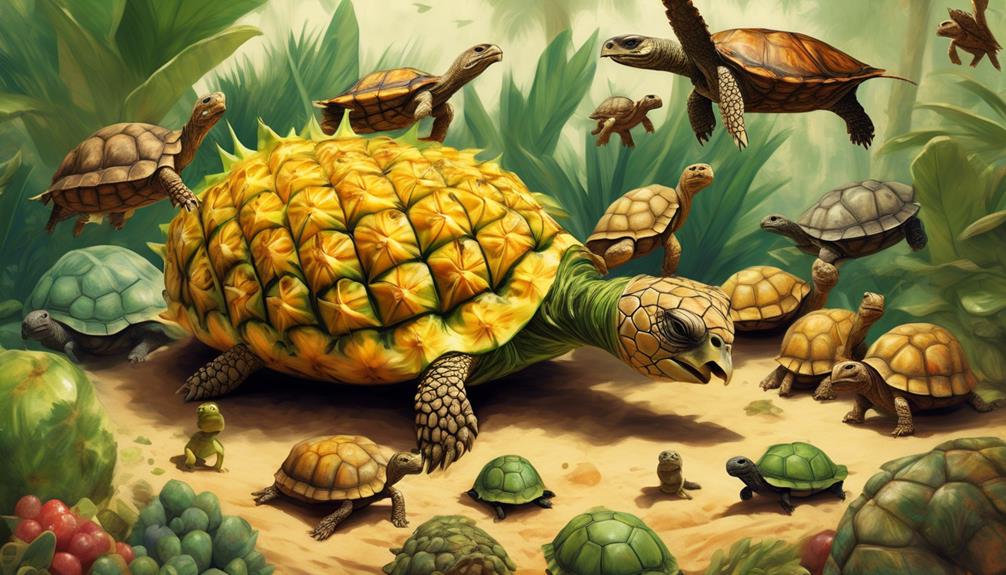
Before feeding pineapple to your turtles, there are a few important factors to consider.
Firstly, you should ensure that the turtle’s natural diet includes the necessary nutrients and minerals.
Secondly, it’s crucial to determine the appropriate portion of pineapple to include in their diet, as it should only be a rare treat due to its high sugar content.
Lastly, consulting a vet is essential to ensure a balanced and healthy diet, including pineapple as an occasional addition, and to avoid any potential digestive issues or nutritional imbalances.
What nutrients and minerals are essential in a turtle’s diet?
Essential nutrients and minerals play a crucial role in maintaining the health and well-being of turtles, making it important to consider their dietary requirements before introducing pineapple into their diet. Here are some key nutrients and minerals that are essential for turtles:
- Calcium: Essential for strong bones and shell development.
- Vitamin A: Important for healthy eyesight and immune system function.
- Vitamin C: Helps boost the immune system and promote overall health.
- Potassium: Aids in muscle function and electrolyte balance.
- Manganese: Necessary for proper growth and development.
- Protein: Needed for tissue repair and growth.
It is important to consult a veterinarian to determine the specific vitamin and mineral needs of your turtle, as different species have different dietary requirements.
Remember to provide a balanced diet that includes a variety of fruits and vegetables, and limit the amount of pineapple due to its high sugar content.
How to determine the appropriate portion of pineapple for a turtle’s diet?
To determine the appropriate portion of pineapple for your turtle’s diet, it’s important to consider their species and individual dietary needs. Different turtle species have varying nutritional requirements, so it’s crucial to research and consult with a veterinarian.
Pineapple should only be fed in small portions as an occasional treat, rather than a staple in their diet. Feeding too much pineapple can lead to an imbalance in their overall nutrition and potentially cause health issues.
When offering pineapple to your turtle, make sure to remove the core and peel, and cut it into small pieces that are easy for them to eat.
Remember to monitor their sugar intake and supplement their diet with a variety of other fruits and vegetables to maintain their overall health.
Can turtles safely consume pineapple as part of their omnivorous diet?
Turtles can safely consume pineapple as part of their omnivorous diet, but it’s important to consider a few factors before feeding it to them. Here’s what you need to know:
- Turtle Nutrition: Pineapple is high in calcium, manganese, copper, and vitamin C, making it a nutritious choice for turtles.
- Appropriate Portion: Feed pineapple in bite-sized pieces, removing the skin and core to prevent any choking hazards for your turtle.
- Moderation: Pineapple should be given as an occasional treat, not as a regular part of their diet. Too much pineapple can lead to digestive issues and liver abscesses in turtles.
As a turtle owner, it’s important to provide a balanced diet for your pet. Consult a vet to determine the best feeding schedule and ensure that pineapple is offered in moderation to maintain your turtle’s health and well-being.
Should pineapple be fed to box turtles and pet turtles in moderation?
When considering feeding pineapple to box turtles and pet turtles, there are important factors to consider to ensure their health and well-being.
While pineapple can be a nutritious addition to their diet, it should be fed in moderation. Too much pineapple can lead to digestive issues and nutritional imbalances in turtles.
It’s recommended to consult a vet to determine the appropriate amount of pineapple to feed your turtle.
If you decide to offer pineapple to your turtle, it’s important to cut the pineapple into small pieces to prevent choking hazards.
Additionally, it’s crucial to supplement their diet with other fruits and vegetables to ensure a well-rounded nutrition.
What are the tips to avoid potential health issues when including pineapple in a turtle’s diet?
Before including pineapple in your turtle’s diet, there are a few important factors to consider:
- Moderation: Monitor pineapple intake to prevent digestive issues and liver abscesses in turtles. Feeding pineapple too often can disrupt their natural diet, so it’s important to limit its consumption.
- Consultation: It’s always a good idea to consult with a veterinarian before introducing any new food into your turtle’s diet. They can provide expert advice on the specific dietary needs of your turtle and ensure a healthy and balanced diet.
- Species-specific: Consider the natural diet of your turtle species. Pineapple should only be fed as a rare treat for appropriate tropical species. It’s crucial to do thorough research to prevent nutritional imbalances and potential health problems.
Consulting a veterinarian about turtle nutrition and diet

If you’re unsure about your turtle’s diet or have concerns about introducing pineapple, it’s best to consult a veterinarian who specializes in reptile care. They can provide personalized guidance on the appropriate balance of nutrients and help address any potential risks or deficiencies.
A veterinarian can also assist in planning a healthy diet that supports your turtle’s growth, immune function, and digestive health.
When should a turtle owner consult a veterinarian regarding a turtle’s diet?
If your turtle is experiencing digestive issues, nutritional imbalances, or unusual weight fluctuations, it’s important to consult a veterinarian regarding their diet. Seeking professional advice can help address any underlying health concerns and ensure that your turtle’s nutritional needs are being met.
Here are some specific instances when you should reach out to a veterinarian about your turtle’s diet:
- If your turtle shows signs of vitamin deficiency or toxicity, such as shell abnormalities, lethargy, or poor appetite.
- If your turtle exhibits symptoms of gastrointestinal distress, like diarrhea, vomiting, or excessive gas.
- If your turtle’s diet change leads to abnormal behavior, such as aggression, excessive hiding, or reduced activity.
What precautions should be taken before introducing pineapple to a turtle’s diet?
Before introducing pineapple to your turtle’s diet, it’s important to consult with a veterinarian to ensure it’s suitable for their specific nutritional needs.
While pineapple can be a nutritious treat for turtles, precautions should be taken to ensure their well-being. Monitor the sugar content in pineapple, as excessive fruit consumption can lead to digestive issues and liver abscesses in turtles.
Remember, pineapple should only be fed occasionally as part of a balanced diet. The frequency and portion size should be determined based on the turtle’s natural diet.
If you’re unsure about your turtle’s dietary needs, it’s best to avoid introducing pineapple and consult a veterinarian for guidance. Your veterinarian will provide expert advice to ensure your turtle’s nutrition is optimal.
What are the potential risks associated with including pineapple in a turtle’s diet?
Including pineapple in a turtle’s diet should be approached with caution due to the potential risks associated with its consumption. While pineapple does offer some nutritional benefits, there are several concerns to consider:
- Digestive issues and liver abscesses: The high sugar content in pineapple can lead to digestive problems and even liver abscesses in turtles.
- Nutritional imbalances: Excessive consumption of pineapple can disrupt a turtle’s natural diet and cause nutritional imbalances.
- Upset stomach and swollen glands: The high acidic content of pineapple can give turtles an upset stomach, diarrhea, and swollen glands around their mouth.
To ensure a healthy and balanced diet for your turtle, it’s crucial to consult a veterinarian. They can provide guidance on the appropriate frequency and portion size for feeding pineapple, which should be done sparingly, ideally once a month or every few months, to avoid potential health problems.
How can a veterinarian assist in planning a healthy diet for tortoises and turtles?
To ensure that your tortoise or turtle has a healthy and balanced diet, consulting a veterinarian is essential in planning their nutrition and diet. Veterinarians have the expertise to assess your turtle’s species, natural diet, and overall health, allowing them to create a suitable diet plan. They can provide guidance on incorporating essential nutrients like vitamins and minerals into your turtle’s diet, ensuring that it aligns with their specific nutritional requirements. Additionally, vets can advise on monitoring your turtle’s diet to avoid nutritional imbalances or potential health issues. They can also help determine suitable treats, such as pineapple, and the frequency at which they should be included in your turtle’s diet. Consulting with a veterinarian is crucial for maintaining your turtle’s well-being and providing them with a healthy, balanced diet.
| How a Veterinarian Can Assist in Planning a Healthy Diet for Tortoises and Turtles | ||
|---|---|---|
| Assessing the turtle’s species, natural diet, and health | Providing guidance on essential nutrients | Advising on monitoring the turtle’s diet |
| Determining suitable treats and their frequency | Ensuring a well-rounded and balanced diet | Preventing nutritional imbalances and health issues |
What role does calcium play in a turtle’s diet and how does it relate to the consumption of pineapple?
Consulting a veterinarian about turtle nutrition and diet can provide valuable information on the role calcium plays in a turtle’s diet and how it relates to the consumption of pineapple. Here are three key points to consider:
- Calcium is crucial for a turtle’s skeletal health and shell development, and pineapple contains a good calcium: potassium ratio that helps in building strong bones for turtles.
- Turtles need a proper calcium intake to maintain healthy bone structure, and while pineapple contains calcium, it should only be fed in moderation due to its high sugar content and potential digestive issues if consumed in excess.
- Pineapples contain calcium, an essential nutrient for turtles, but their high sugar content can lead to health problems, and while they can be part of a varied diet, they should be offered sparingly to avoid potential nutritional imbalances and digestive issues.
Therefore, it’s important to consult with a veterinarian to determine the appropriate amount of pineapple and other calcium-rich foods to include in your turtle’s diet to ensure optimal health.
Conclusion
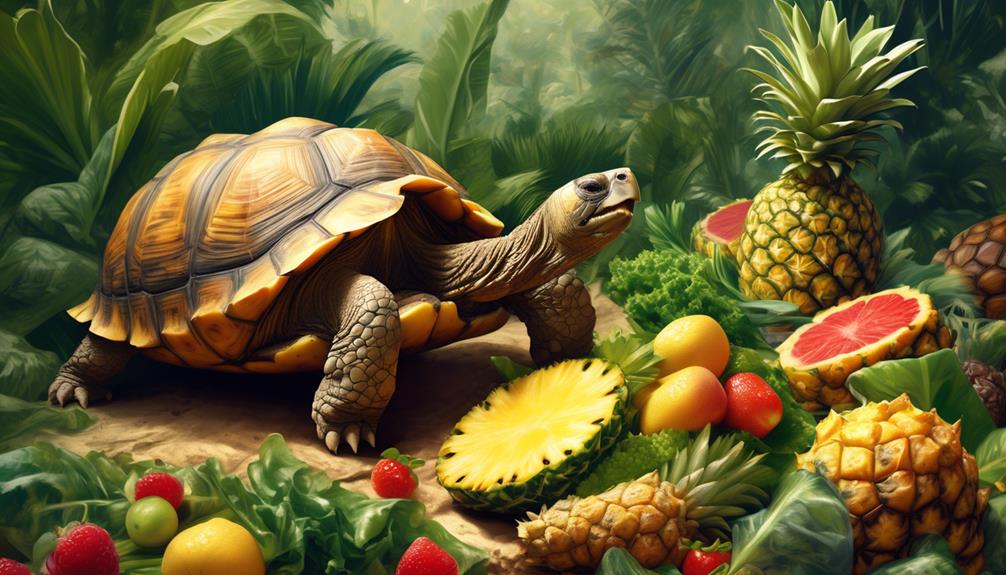
To conclude, while turtles can eat pineapple as an occasional treat, it’s important to consider the key considerations and potential risks involved.
A balanced diet is crucial for the overall health and well-being of turtles and tortoises, so it’s essential to supplement pineapple with other nutritious foods.
Consulting with a veterinarian and monitoring the signs of a healthy and balanced turtle diet can help ensure the best nutrition for your pet.
Can turtles safely consume pineapple as part of their diet?
Turtles should consume pineapple sparingly as part of their diet to avoid potential health risks caused by its high sugar content. While pineapple can provide some nutritional benefits, it should be fed in moderation due to its negative effects in large amounts. Here are a few reasons why turtles should limit their pineapple consumption:
- Excessive sugar intake can be harmful: The high sugar content in pineapple can disrupt a turtle’s natural diet and potentially lead to obesity, diabetes, and other health issues.
- Nutritional imbalances: Feeding pineapple too often without a balanced diet can cause nutritional imbalances, depriving turtles of other essential nutrients they need.
- Acidic nature of pineapples: Pineapples are acidic fruits, and regular consumption can also potentially harm the digestive system of turtles.
To ensure the well-being of your turtle, it’s best to offer pineapple as an occasional treat rather than a regular part of their diet.
What are the key considerations when offering pineapple to box turtles and pet turtles?
When offering pineapple to box turtles and pet turtles, it’s essential to consider their dietary needs and offer it as a rare treat in moderation.
While pineapple can be a nutritious addition to their diet, it shouldn’t be the main component. The high sugar content and potential digestive issues associated with pineapple make it important to feed it sparingly.
It’s crucial to base the feeding of pineapple on the turtle’s species and natural diet, and consulting a vet is recommended for a balanced diet plan. Excessive consumption of pineapple can disrupt their natural diet and lead to health problems.
Therefore, it’s crucial to limit pineapple as a rare treat for appropriate turtle species and avoid feeding it if unsure about the turtle’s dietary needs. Providing a balanced diet with species-appropriate foods and consulting a vet for specific dietary guidance are essential considerations when offering pineapple to turtles.
How can a balanced diet impact the overall health and well-being of turtles and tortoises?
As you consider the impact of a balanced diet on the overall health and well-being of turtles and tortoises, it becomes evident that proper nutrition is essential for their growth, maintenance, and disease prevention.
Here are three ways a balanced diet can positively impact these reptiles:
- Shell and bone development: A well-balanced diet provides the necessary calcium and other minerals for strong shells and healthy bone growth. This ensures that turtles and tortoises have a solid foundation for their protection and mobility.
- Organ function: Nutritious foods support the proper functioning of vital organs, such as the heart, liver, and kidneys. This helps maintain optimal health and allows these creatures to thrive in their environments.
- Strong immune system: A balanced diet rich in vitamins, minerals, and antioxidants strengthens the immune system of turtles and tortoises. This boosts their ability to fight off infections and diseases, promoting longevity and overall well-being.
What are the potential risks and benefits of including pineapple in a turtle’s diet?
Including pineapple in a turtle’s diet can have both potential risks and benefits. While pineapple is high in essential vitamins and minerals such as calcium, manganese, copper, and vitamin C, it should be fed rarely due to its high sugar content. Excessive consumption of pineapple can lead to digestive issues and liver abscesses in turtles. Additionally, feeding pineapple too often can disrupt a turtle’s natural diet and cause nutritional imbalances. It is important to consult a vet to ensure a healthy and balanced diet for your turtle, including rare treats like pineapple. Feeding pineapple once a month or every few months is recommended to avoid potential health risks for turtles.
| Potential Risks | Potential Benefits |
|---|---|
| High sugar content | Essential vitamins |
| Digestive issues | and minerals |
| Liver abscesses | Aid in digestion |
| Nutritional imbalances | |
What are the signs of a healthy and balanced turtle diet?
To ensure that your turtle is on a healthy and balanced diet, it’s important to look for specific signs that indicate their nutritional needs are being met. Here are some signs to watch out for:
- Steady growth: A healthy turtle should exhibit consistent growth over time, indicating that they’re getting enough nutrients to support their development.
- Vibrant shell coloration: A turtle with a vibrant and glossy shell is a good sign of a well-balanced diet. Dull or discolored shells may indicate a lack of essential nutrients.
- Regular shedding: Turtles shed their scutes regularly as they grow. If your turtle is shedding regularly and without difficulty, it suggests that their diet is providing the necessary nutrients for healthy skin and shell.
Conclusion
In conclusion, pineapple can be a nutritious addition to a turtle’s diet. It provides essential nutrients, fiber, and bromelain for digestion.
However, it should be fed in moderation as a treat, not a staple food.
It’s important to supplement pineapple with other fruits and vegetables to ensure a well-rounded diet.
Remember to consult a veterinarian for expert advice on turtle nutrition and diet to provide the best care for your pet.





